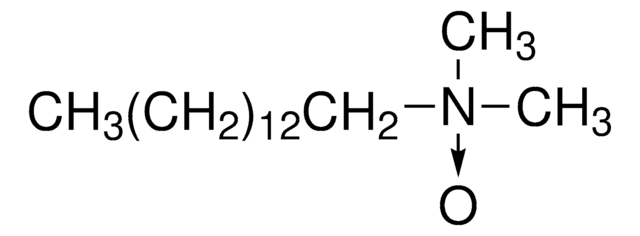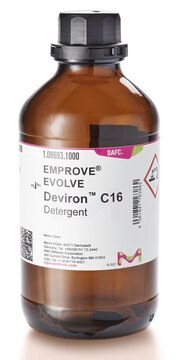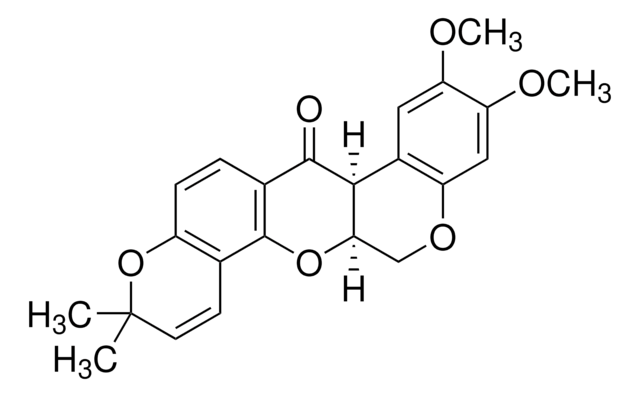40231
N,N-Dimethyldodecylamine N-oxide solution
BioUltra, ~0.1 M in H2O
Synonym(s):
DDAO, LDAO, Lauryldimethylamine N-oxide
About This Item
Recommended Products
description
non-ionic
Quality Level
product line
BioUltra
form
liquid
mol wt
229.40 g/mol
concentration
~0.1 M in H2O
technique(s)
PCR: suitable
impurities
insoluble matter, passes filter test
≤0.005% peroxides (as H2O2)
refractive index
n20/D 1.336
pH
7.0-9.0 (25 °C, 0.1 M in H2O)
density
0.996 g/mL at 20 °C
anion traces
chloride (Cl-): ≤50 mg/kg
sulfate (SO42-): ≤50 mg/kg
cation traces
Al: ≤1 mg/kg
As: ≤0.1 mg/kg
Ba: ≤1 mg/kg
Bi: ≤1 mg/kg
Ca: ≤5 mg/kg
Cd: ≤1 mg/kg
Co: ≤1 mg/kg
Cr: ≤1 mg/kg
Cu: ≤1 mg/kg
Fe: ≤1 mg/kg
K: ≤20 mg/kg
Li: ≤1 mg/kg
Mg: ≤1 mg/kg
Mn: ≤1 mg/kg
Mo: ≤1 mg/kg
Na: ≤20 mg/kg
Ni: ≤1 mg/kg
Pb: ≤1 mg/kg
Sr: ≤1 mg/kg
Zn: ≤1 mg/kg
λ
0.1 M in H2O
UV absorption
λ: 260 nm Amax: ≤0.07
λ: 280 nm Amax: ≤0.06
SMILES string
CCCCCCCCCCCC[N+](C)([O-])C
InChI
1S/C14H31NO/c1-4-5-6-7-8-9-10-11-12-13-14-15(2,3)16/h4-14H2,1-3H3
InChI key
SYELZBGXAIXKHU-UHFFFAOYSA-N
Looking for similar products? Visit Product Comparison Guide
Other Notes
Not finding the right product?
Try our Product Selector Tool.
Signal Word
Danger
Hazard Statements
Precautionary Statements
Hazard Classifications
Aquatic Chronic 3 - Eye Dam. 1
Storage Class Code
10 - Combustible liquids
WGK
WGK 1
Flash Point(F)
Not applicable
Flash Point(C)
Not applicable
Personal Protective Equipment
Choose from one of the most recent versions:
Already Own This Product?
Find documentation for the products that you have recently purchased in the Document Library.
Our team of scientists has experience in all areas of research including Life Science, Material Science, Chemical Synthesis, Chromatography, Analytical and many others.
Contact Technical Service








